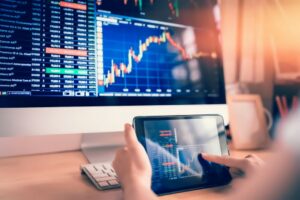The forex market, also known as the foreign exchange market, is the largest and most liquid financial market in the world. It operates 24 hours a day, five days a week, and sees a daily trading volume of over $6 trillion. In this vast market, various participants play different roles, including retail traders, institutional investors, and market makers.
Market makers are an essential part of the forex market, providing liquidity and facilitating the smooth operation of trading. In this article, we will explore what a forex market maker is and how they influence trading.
What is a Forex Market Maker?
A forex market maker is a financial institution or individual that quotes both a buy and sell price in a currency pair, thereby creating a market for traders to buy and sell currencies. They act as intermediaries between buyers and sellers, ensuring that there is always a counterparty for every trade.
Market makers accomplish this by maintaining an inventory of currencies, allowing them to execute trades almost instantly. They offer bid and ask prices, which represent the highest price a buyer is willing to pay (bid) and the lowest price a seller is willing to accept (ask).
How Do Forex Market Makers Influence Trading?
1. Liquidity Provision: One of the primary roles of market makers is to provide liquidity to the market. By offering both buy and sell prices, they ensure that there is always someone willing to take the other side of a trade. This liquidity allows traders to enter and exit positions quickly and at competitive prices.
2. Spreads: Market makers typically earn their profit through the spread, which is the difference between the bid and ask prices. They aim to buy at a lower price and sell at a higher price, pocketing the difference as their profit. Market makers often offer tight spreads, particularly for major currency pairs, to attract traders and encourage trading activity.
3. Market Stability: Market makers play a crucial role in maintaining stability in the forex market. They absorb excess supply or demand, preventing extreme price fluctuations. For instance, if there is a sudden surge in selling pressure, market makers can step in and buy the excess supply, stabilizing the market. This helps prevent sharp price movements that could negatively impact traders and market participants.
4. Order Execution: Market makers ensure that traders’ orders are executed promptly and at the best available price. They provide continuous quotes, allowing traders to execute trades at any time. Market makers use sophisticated trading systems and algorithms to match buyers and sellers efficiently, minimizing order slippage and delays.
5. Price Discovery: Market makers contribute to price discovery in the forex market. Their constant quoting of bid and ask prices provides valuable information about the current market sentiment and demand-supply dynamics. Traders can use this information to analyze market trends, identify potential trading opportunities, and make informed trading decisions.
6. Spread Manipulation: While market makers aim to provide competitive spreads, there have been instances where some market makers manipulated spreads for their benefit. This unethical practice, known as spread manipulation, involves artificially widening spreads to increase their profit margins. However, regulatory bodies have implemented measures to prevent such malpractices, ensuring a fair and transparent trading environment.
In conclusion, forex market makers are vital participants in the forex market, providing liquidity, stability, and efficient order execution. They play a significant role in influencing trading by offering bid and ask prices, maintaining tight spreads, and stabilizing the market. Traders should be aware of their influence and choose reputable market makers to ensure a fair and transparent trading experience.






